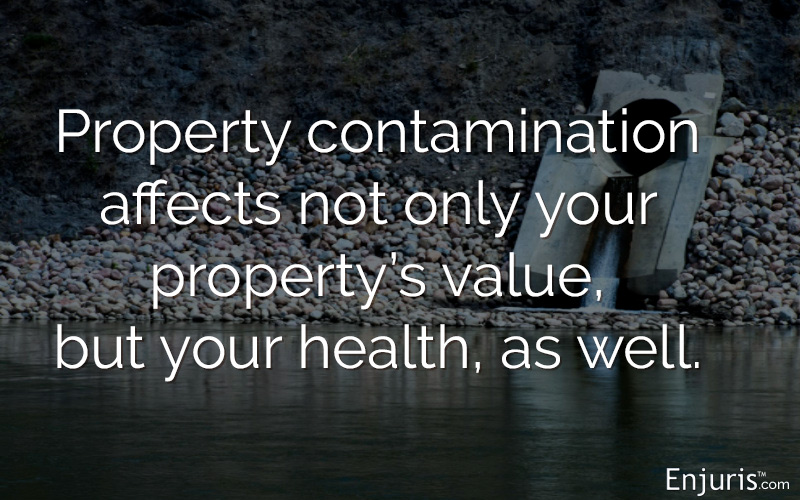Hablamos español.
Texas property owners have a legal right to compensation for contamination to their property
According to the United States Energy Information Administration, Texas is the leading US producer of crude oil and natural gas. In 2017, the state accounted for 37% of the nation's crude oil production and 24% of its natural gas production.
Although the economic benefits of the oil and gas industry are obvious, there’s a price to be paid.
Some oil and gas companies have been known to cut corners in order to increase their profits. When this happens, drilling sites may not be cleaned up properly, waste may be disposed of hastily, and private property may become contaminated.
Property contamination not only decreases property values, but it can cause owners to experience serious health issues.
If your land has been dangerously contaminated—whether it’s the fault of an oil and gas company or someone else—you’re probably concerned about the future state of your property and health.
In an effort to put your mind at ease, we’ve answered some of the most common questions regarding property contamination in Texas.
How does property become contaminated?
There are countless ways that your property could become contaminated. The following are some of the most common causes of property contamination in Texas:
- Oil spills
- Improperly disposed of chemicals or solid waste
- Negligent drilling practices
- Leaking pipes or storage tanks
- Hydraulic fracking
Any of these situations could cause water, air, or soil pollution resulting in health issues for you and your family and/or a loss in the quality of your land.
What’s a toxic tort?
The term “toxic tort” refers to a personal injury lawsuit brought due to an injury caused by exposure to a dangerous substance. The most famous toxic tort cases are probably the asbestos exposure cases that were first filed in the 1930s and continue to this day.
Toxic torts include a whole host of cases, including property contamination cases.
Can I sue someone if my property is contaminated?
It’s not always clear whether you can successfully sue for property contamination. In order to do so, someone must generally be at fault. In most cases, this means you have to prove that someone or some entity was negligent.
Specifically, you must show that:
- The person or entity owed you a legal duty,
- The legal duty was breached, and
- The breach caused you harm.
Proving that a person or entity’s breach of duty caused your harm is often the most difficult element to prove in a property contamination case. This is especially true if you’re alleging that exposure to a toxic substance caused you physical harm, as tracing an illness (specifically when the symptoms of an illness might not appear for years after the exposure) to a single incident can be challenging.
Can I sue for fracking?
Hydraulic fracturing (commonly known as “fracking") has become a major issue of contention in Texas and the rest of the country, especially in light of chronic drought conditions. This controversial process involves extracting shale oil by blasting pressurized water, chemicals, and sand to break up underground formations.
Unfortunately, fracking has been shown to contaminate or eliminate already-struggling water sources. If you’re negatively impacted by fracking, you can sue the responsible party just like you could with any other property contamination case.
What damages can I collect?
If you can prove that someone or some entity is at fault for your property contamination, you can receive compensation. But what exactly can you recover?
In Texas, you can generally recover the following damages in a property contamination case:
- Past and future medical expenses
- Lost wages
- Pain and suffering
- Cost of restoring your property to the condition it was in prior to the contamination
In rare cases, your compensation may extend beyond compensatory damages. You may receive punitive damages, but only in the event that the defendant’s actions were intentional or grossly negligent.
Who’s going to clean up my property?
Most of the time, contaminated property is cleaned up using a land remediation plan.
Land remediation is the process by which a piece of property is returned to its prior condition by removing toxins, monitoring cleanup results, and preventing future contamination from occurring.
A remediation plan typically requires cooperation between the landowner, the at-fault party, and third-party environmental or industrial organizations.
How does an attorney fit into a property contamination case?
An attorney is an integral part to your property contamination case. These cases often involve large corporations with money to spend on defense attorneys. You’ll need all the help you can get to establish contamination, establish fault, and fight for the appropriate compensation.
While you aren’t required to hire an attorney in Texas, if you do decide to move forward with one, make sure that they are familiar with the ins and outs of property contamination and toxic tort law. If you don’t know where to start, take a look at our free online directory.
See our guide Choosing a personal injury attorney.


